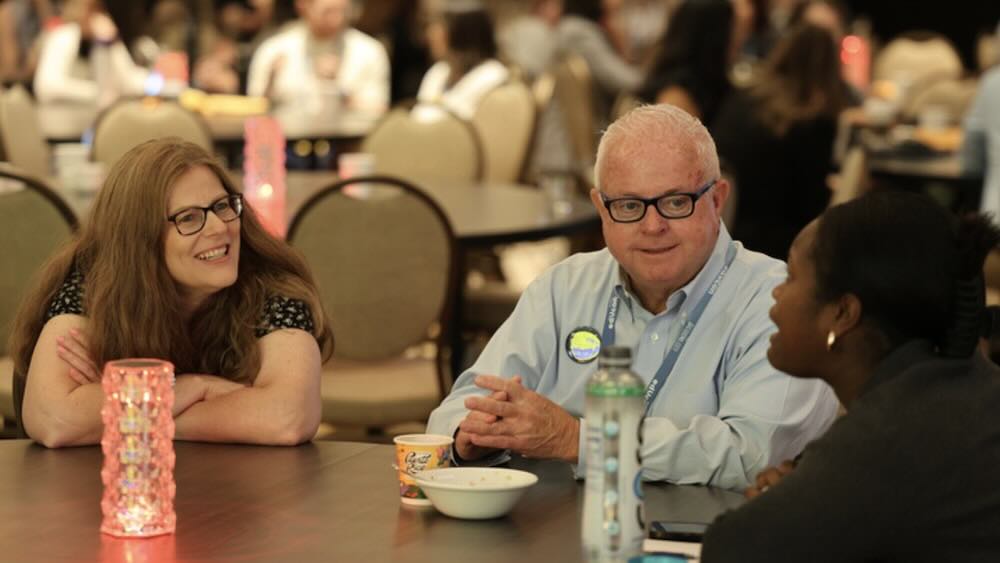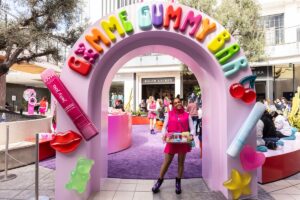


The survey responses revealed generational differences in how meeting participants perceive barriers to networking. Photo courtesy Jacob Slaton / Whatever Media Group
Half of all meeting participants say that successful networking is the top thing that motivates them to return to an event, according to a networking trends report released in July by Freeman. Networking is even more important to emerging generations, with a higher percentage indicating that it’s their top reason to attend events, said Ken Holsinger, Freeman’s senior vice president, strategy and research. “Among Gen Z, the figure is 65 percent.”
But there’s a big difference between how attendees define successful networking and how meeting planners see their role in supporting it at events, according to the Freeman report “Unpacking XLNC: How to Architect Serendipity and Connect People in Meaningful Ways.” (XLNC — a Freeman-created framework — stands for experience, networking, learning, and commerce.) “The No. 1 thing the attendees tell us [about networking] is that they want you to bring them subject matter experts and help them connect,” Holsinger told Convene. “And they want meeting planners to determine topics they can network around.”
Yet when meeting organizers were asked about their role, that kind of curation around networking is at the bottom of most of their lists. Only 14 percent named attracting subject matter experts who are available to network with participants as a top responsibility. Even fewer — only one out of 10 — chose determining networking topics for participants. The three networking-related responsibilities that meeting planners put at the top of the list were making time on the agenda for it (58 percent); having activities where attendees and/or exhibitors were likely to meet (56 percent); and hosting evening gatherings/parties (52 percent).
- Claim or renew your subscription to Convene.
- Want deep-dive insights on events delivered to your inbox? Sign up for our newsletters.
Events need to provide space for people to meet, and “yes, we need to provide food and drink,” Holsinger said. Those are important components — seven out of 10 survey respondents said that free food and drink added value to networking at events. But providing food and drink and a place to meet “are the easiest part of the equation,” he said. By stopping there, event organizers are missing the opportunity to provide what the report called the most powerful networking variable — gathering people together around a specific purpose. “Most meeting planners will talk about how amazing serendipity is at face-to-face events — that ‘it’s just part of the magic of events.’” With the phrase “architecting serendipity,” Holsinger said, “I’m coming back and poking a little bit at that and saying, there’s a way to design for this.”
Barriers to Networking
The survey responses revealed generational differences in how meeting participants perceive barriers to networking. Overall, four out of 10 attendees aged 20 to 44 find it awkward, compared to 31 percent of overall attendees. That same percentage — 40 percent — of younger attendees said that networking feels too “salesy,” compared to 34 percent of overall attendees. Thirty percent of younger respondents said that they aren’t good at starting conversations, compared to one-quarter of overall respondents.
The group who perceives the barriers to networking to be highest — aged 20 to 44 — are digital natives, the trends report points out. “They might be the most connected generation in history, but not necessarily in the ways that matter most.” Although they’ve grown up building relationships through screens, “we know from previous reports that we’ve done that [digital natives] also trust in-person experiences more,” Holsinger said.
But many of them may not have had the opportunity to develop networking skills — “the muscle memory of hallway chats or water cooler banter,” it noted, citing a study published by AllWork that revealed that nearly one in five Gen Zers have never held an in-person job. In the study, Gen Z remote employees reported that making friends (61 percent), networking (39 percent), and finding a mentor (39 percent) were their biggest on-the-job challenges.
Not recognizing those needs is another lost opportunity, Holsinger said. “I think that we in the experiential space need to understand that that’s an opportunity to provide guidance and experience to the next generation.”
Barbara Palmer is Convene’s deputy editor.
Download the full report here.






